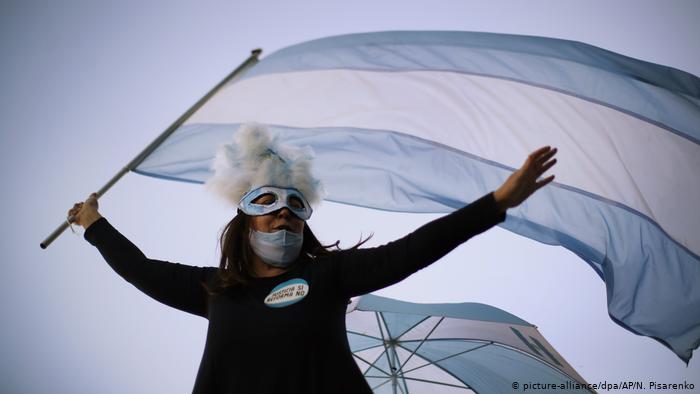RIO DE JANEIRO, BRAZIL – Argentine President Alberto Fernández announced that, with the exception of two cities, Argentina will now officially emerge from social isolation, considered the most prolonged in the world. Fernández urged the population to maintain protection efforts and not to relax care.
“We have found that over the past two weeks, the number of cases in the country has dropped by approximately 30%. We will maintain social isolation in only two cities: Bariloche and Puerto Deseado (both in Patagonia). This new stage runs until December 20th,” President Alberto Fernández announced, stressing that “the population must continue the efforts because the pandemic problem has not been overcome.”

The request for Argentines to maintain their efforts came on Friday night, a day after the massive crowds around the wake of ex-soccer player Diego Maradona, organized by the government.
The ceremony, in which approximately one million people failed to maintain social distancing or protection measures, led the opposition to denounce President Alberto Fernández for favoring the spread of the coronavirus.
“The images we saw from the wake are something we should prevent. Of course they are an epidemiological risk, the impact of which we will see within seven or ten days,” criticized the Health Minister of Buenos Aires, Fernán Quirós.
The turn of the interior
The announcement of the end of quarantine applies to ten of Argentina’s 24 provinces, the majority inland. In the Buenos Aires metropolitan area, the end of the so-called “eternal quarantine” began on November 9th, after 233 days of isolation.
However, the end of quarantine did not lift restrictions. Public transportation, for instance, is reserved for activities considered essential.
The lengthof the quarantine helps to understand the dramatic decline in Alberto Fernández’s popularity; in March he had a 67.8% positive rating and now has 32.4%, according to Giacobbe & Asociados consultancy.
“It is a steep process of disillusionment,” says political analyst Jorge Giacobbe, author of the study, the most recent published this week.
“The figures show that the quarantine made no sense anymore. The mistake was to use quarantine as the only means to control the pandemic. The government was left with no room to persist with the lockdown, while cases only increased,” says the analyst.
The study also points out that 64.2% of Argentines agree with the shift from isolation to social distancing. “Argentines are exhausted. Social fatigue after eight months has reached its limit. The rational stage of quarantine had ended months ago,” concludes Giacobbe.
Holding out until the vaccine
The president also outlined the country’s new goal in relation to the pandemic: to vaccinate as many people as possible between January and March when autumn will begin.
“We have the advantage of observing what is happening with the pandemic in the Northern Hemisphere. A second wave with a truly alarming number of infections. It is very possible that Argentina will face a second wave. So the more careful we are, the easier it will be to face autumn,” Fernández compared.
To prevent this European wave, Argentina intends to immunize 13 million people.
“When March comes, we want all risk groups to be immunized. The total number of people who should be vaccinated between January and March is 13 million, about 25% of Argentines. This is the effort that we must now address,” the president pointed out.
After March, immunization will continue with those outside the risk group. The vaccine will be free for the population, albeit not mandatory.
“I invite everyone to be part of this epic that is to care for health. We will need about 20,000 volunteers. With all our effort, Argentina could vaccinate between 4.5 and five million people per month”, Fernández estimated.
Despite the longest and most rigid quarantine in the world, Argentina ranks ninth in the world with the most cases, notwithstanding its being one of the countries testing the least. There have been 1.407 million infections and 38,216 deaths.
In relation to its population, it ranks 23rd, worse than Brazil (28th), Peru (30th) and Chile (32nd), among South American countries with the highest case rate. With respect to its population, Argentina ranks 8th in number of deaths. Peru ranks 3rd and Brazil is placed 11th.

